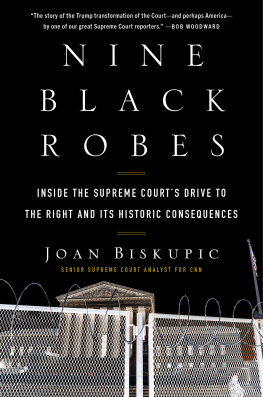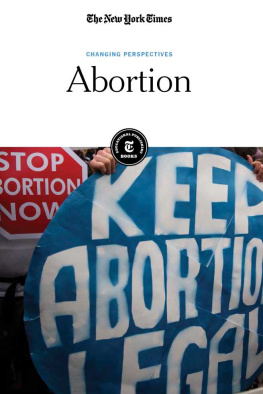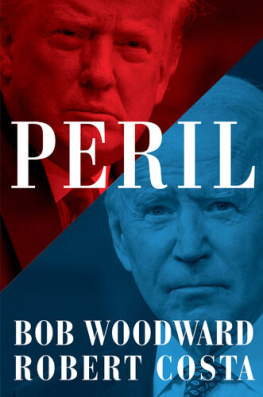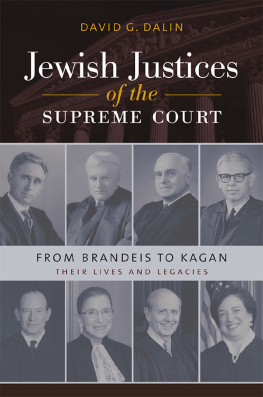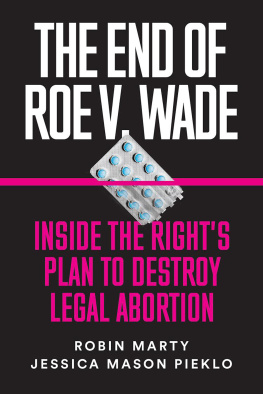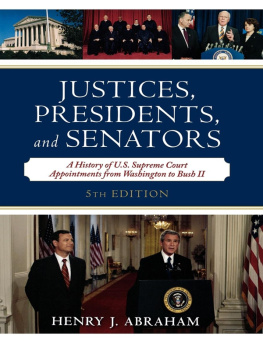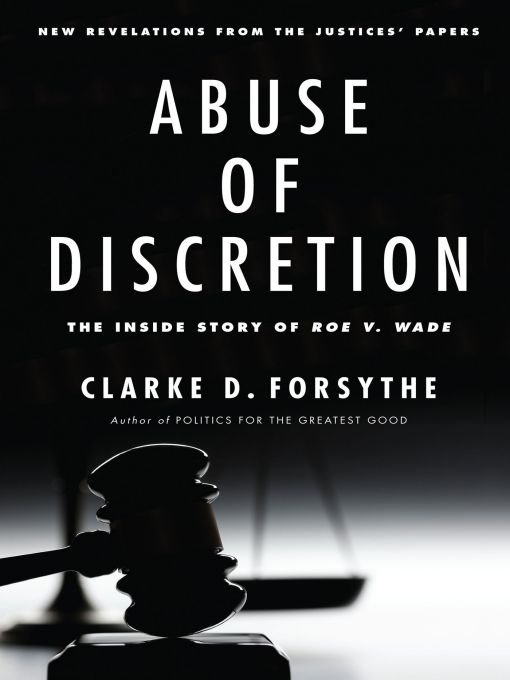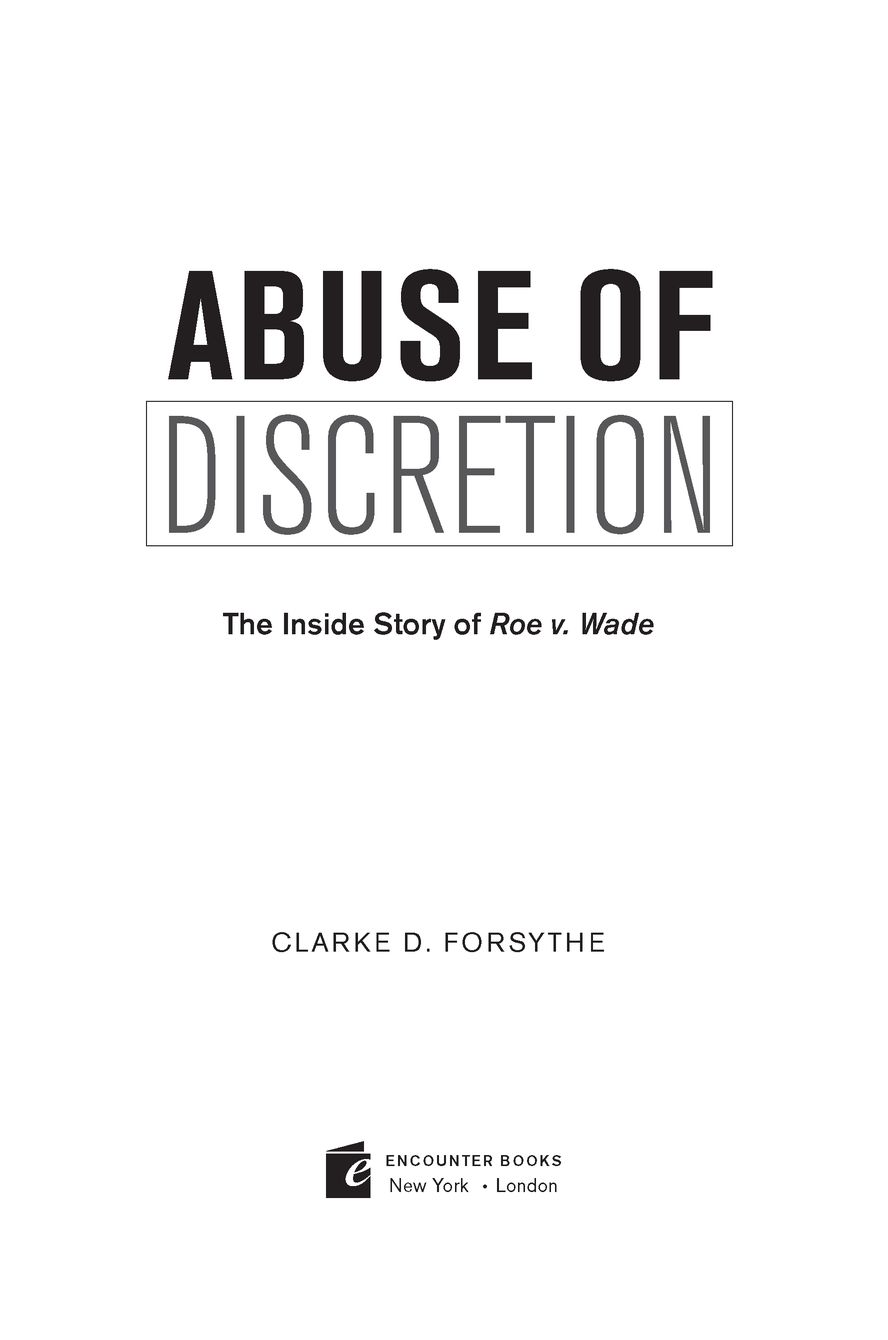Table of Contents
For Karen
THE JUSTICES AND THE ADVOCATES
The Justices
Justice Hugo Black (18861971) United States Senator from Alabama (19271937), appointed by President Franklin D. Roosevelt in 1937; retired due to ill health and died in September 1971, three months before the first oral arguments in Roe v. Wade and Doe v. Bolton.
Justice Harry Blackmun (19081999) Federal appeals judge before nomination to the Supreme Court by President Richard M. Nixon in 1970; author of the opinions in Roe v. Wade and Doe v. Bolton.
Justice William J. Brennan, Jr. (19061997) New Jersey Supreme Court Justice (19511956), appointed by President Dwight D. Eisenhower in 1956; voted with the majority in Roe v. Wade and Doe v. Bolton to strike down the Texas and Georgia abortion laws.
Chief Justice Warren E. Burger (19071995) Appointed by President Richard M. Nixon in 1969; voted with the majority in Roe v. Wade and Doe v. Bolton to strike down the Texas and Georgia abortion laws; distanced himself from the abortion decisions at the time of his retirement in 1986.
Justice Tom C. Clark (18991977) Attorney General of the United States (19451949), appointed by President Harry Truman in 1949; joined the majority in Griswold v. Connecticut in 1965 to strike down the Connecticut criminal prohibition on the marital use of contraception; retired in 1966 and published a very influential law review article in 1968, arguing that abortion laws should be repealed.
Justice William O. Douglas (18981980) Appointed by President Franklin D. Roosevelt in 1939. Upon his retirement in November 1975, Time magazine called Douglas the most doctrinaire and committed civil libertarian ever to sit on the court; voted with the majority in Roe v. Wade and Doe v. Bolton to strike down the Texas and Georgia abortion laws.
Justice John Marshall Harlan (18991971) Federal appeals judge before nomination to the Supreme Court by President Dwight D. Eisenhower; retired in September 1971 one week after Justice Black due to ill health, three months before the first oral arguments in Roe v. Wade and Doe v. Bolton.
Justice Thurgood Marshall (19081993) The leading civil rights lawyer in the United States in the 1940s and 1950s who argued and won Brown v. Board of Education in 1954; appointed by President Lyndon B. Johnson in 1967; voted with the majority in Roe v. Wade and Doe v. Bolton to strike down the Texas and Georgia abortion laws.
Justice Lewis F. Powell (19071998) Appointed in 1971 by President Richard M. Nixon to replace Justice Black; voted with the majority in Roe v. Wade and Doe v. Bolton to strike down the Texas and Georgia abortion laws; later called the abortion opinions the worst opinions I ever joined.
Justice William H. Rehnquist (19242005) Appointed by President Richard M. Nixon in 1972 to replace Justice Harlan; one of two dissenters in Roe v. Wade and Doe v. Bolton; became Chief Justice when Warren Burger retired in 1986.
Justice Potter Stewart (19151985) Appointed by President Dwight D. Eisenhower in 1958; voted with the majority in Roe v. Wade and Doe v. Bolton to strike down the Texas and Georgia abortion laws.
Justice Byron White (19172002) Deputy U.S. Attorney General, 19611962; appointed by President John F. Kennedy in 1962; one of two dissenters in Roe v. Wade and Doe v. Bolton.
The Advocates
Dorothy Toth Beasley (1937) Assistant Attorney General for Georgia who defended the 1968 Georgia abortion law, arguing both the first and second arguments in the Supreme Court in Doe v. Bolton; later Chief Judge of the Court of Appeals of Georgia.
Sandra Cano (1951) The Georgia plaintiff who filed suit in 1970 under the pseudonym Mary Doe to strike down the Georgia abortion law enacted in 1968; she eventually opposed the abortion decisions and sought a rehearing of her case to get it reversed; in 2005, she testified before Congress against the abortion decisions.
Robert C. Flowers (19232009) The Assistant Attorney General for Texas who argued the defense of the Texas abortion law in the second oral argument in Roe v. Wade on October 11, 1972; later the Executive Director of the Texas State Commission on Judicial Conduct.
Jay Floyd (19231996) The Assistant Attorney General for Texas who argued the defense of the Texas abortion law in the first oral argument in Roe v. Wade on December 13, 1971.
Margie Pitts Hames (19341994) The Atlanta attorney for Sandra Cano (Mary Doe) who challenged the Georgia abortion law and won; argued the first and second arguments in Doe v. Bolton in the Supreme Court.
Roy Lucas (19422003) Lawyer who filed many of the state and federal court cases challenging state abortion laws that led to the abortion decisions; co-counsel with Sarah Weddington in the Supreme Court in Roe v. Wade.
Norma McCorvey (1947) The Texas plaintiff who filed suit in 1970 under the pseudonym Jane Roe to strike down the Texas abortion law; like Sandra Cano, McCorvey eventually opposed the abortion decisions and sought a rehearing of her case to get it reversed, and filed briefs in the Supreme Court in subsequent abortion cases to overturn Roe v. Wade.
Sarah Weddington (1945) The attorney for Norma McCorvey (Jane Roe) who challenged the Texas abortion law; at the age of twenty-six, she argued both the first and second arguments in Roe v. Wade and won.
INTRODUCTION
Solving the Puzzle of Roe v. Wade
And in Roe v. Wade and Doe v. Bolton, when the Court had its most dramatic opportunity to express its supposed aversion to substantive due process, it carried that doctrine to lengths few observers had expected, imposing limits on permissible abortion legislation so severe that no abortion law in the United States remained valid.
LAURENCE TRIBE
Thus, in one bold, cataclysmic move the Court undid
about a century of legislative action. It swept away every
abortion law in the country.
LAWRENCE FRIEDMAN
Tuesday, January 16, 1973, was, looking back, the calm before the storm. But Justice Harry Blackmun was a constant worrier, and nothing worried him more than the two abortion decisions that the Supreme Court was set to release on Monday, January 22. After a solid career as a lawyer in Minnesota and a decade as a respected federal judge, Blackmun had been nominated to the Supreme Court in 1970 by President Richard Nixon. Chief Justice Warren Burger, Blackmuns boyhood friend, had recommended him to Nixon after Nixons first two nominees to the Court, Clement Haynsworth and G. Harrold Carswell, had been rejected by the Senate. Blackmun often doubted his own ability to do the job, and suspected that other Justices, like Hugo Black, Potter Stewart, and William O. Douglas, shared his doubts. Even his most sympathetic biographers referred to Justice Blackmun as ever the martyr because of his frequent complaints about the burden of the job.



